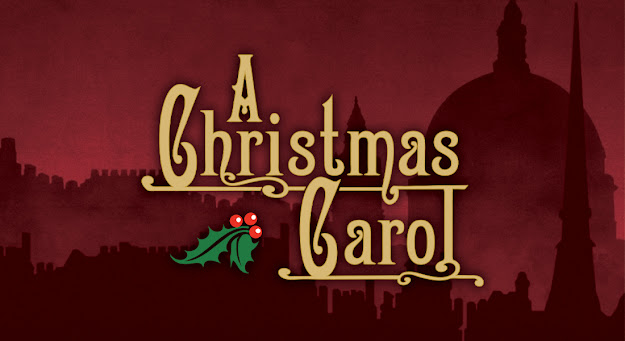A Christmas Carol, Ford's Theatre, Washington, DC
Charles Dickens wrote A Christmas Carol in 1843. The
novella has been a staple of Christmas celebrations ever since. There have been
numerous iterations of the story as a play and as a film. I daresay that
Dickens’s “ghost story of Christmas” might be almost as universally known as
that other Christmas story with shepherds and wise men. The name “Scrooge” has
become synonymous with the miserly penny-pincher or the disagreeably dour, and inextricably
linked with his trademark put-down: “Bah, humbug!”
The story is deceptively simple. On Christmas Eve, Ebenezer
Scrooge is visited by four ghosts. First, the ghost of his late business
partner, Jacob Marley. Marley’s Ghost explains that there will be three more
visitors, the Ghosts of Christmas Past, Present, and Future. Each of the ghosts
will show Scrooge as he was, as he is, and as he may be, if he does not alter
his behavior. He is specifically shown himself as a youth in the Past, and his
nephew Fred and the family of his clerk, Bob Cratchit, in the Present and the
Future.
Scrooge is deeply affected by these visions. He awakens the
next morning, Christmas Day, resolved to be a different man. Suddenly he is
free-spirited and generous.
Dickens is not just telling a story about redemption, his
writing about the poor and destitute, especially among children, is powerful social
commentary. Especially striking is the moment in which the Ghost of Christmas
Present introduces two poor children, Ignorance and Want, warning us of the
consequences of those conditions.
As many times as you may have seen A Christmas Carol
in one form or another (I even recall as
a child seeing a cartoon version with the character “Mister Magoo” as Scrooge),
Ford’s Theatre’s current production is transformative. The novella has been adapted
for the stage numerous times, but this adaptation is by Michael Wilson,
originally directed by Michael Baron and currently directed by Jose
Carrasquillo, captures the Dickens’s view of mid-19th century London
by inserting a variety of familiar (and some less familiar) Christmas carols
seamlessly into the story. There is something particularly special about seeing
the production in an historic theatre opened just 20 years after Dickens wrote the
novella.
Craig Wallace plays Ebenezer Scrooge for the eighth year, providing considerable bravura and bluster in the role. Though he has played the role many times, there is nothing stale about his work here. At the beginning of the play, he is thoroughly hateful, frightening, and villainous. He is dubious and fearful about the ghosts’ visits, but accepts them as real, finally (and believably) achieving redemption as he becomes a benevolent, generous, wholly changed man. Wallace’s performance is a master class in acting.
Craig Wallace as Scrooge in A Christmas Carol.
Joining him on this journey is an outstanding ensemble of 16
adults and six children. All are worthy of praise, but several are particularly
outstanding. Justine “Icy” Moral is ethereal and charming as the Ghost of
Christmas Past, floating effortlessly about the stage. Kimberly Gilbert is a
bright light (in more ways than one) and more than a bit sassy as the Ghost of
Christmas Present. Jonathan Atkinson is a sturdy and sympathetic Bob Cratchit.
John Floyd is suave and sunny as Scrooge’s nephew Fred, also doubling as the
younger Ebenezer. The children are just as professional in their performances
as the adults. (And having two of the children handle the “please turn off your
cell phones” message at the beginning of the play was unexpected but totally
effective.)
The design, including Lee Savage (scenic), Alejo Vietti
(costumes), Rui Rita (lighting), Charles G. LaPointe (wigs), and John Schmidt
(sound and original music), takes us, quite convincingly, to Victorian London
and accomplishes amazing special effects that defy logic and explanation. (I am
still confounded by what happens to Scrooge’s bed. Awesome!) Their work with
director Carrasquillo, choral director Jay Crowder, dialects and vocal director
Rachel Hirshorn-Johnston, and choreographer Shea Sullivan casts a spell that almost
makes you believe the ghosts are real. The production is a jewel of sight and
sound, flawlessly delivered.
I have seen or read (and once even adapted and performed a
reader’s theatre version) A Christmas Carol many times. As familiar as the
story is, experiencing this imaginative, beautifully-executed production was a
more emotional experience than I had anticipated. No wonder the Ford’s
production of A Christmas Carol is a holiday tradition for many families
in the DMV. I left the theatre uplifted, ready for the Christmas season to
commence. Performances continue through December 31.






What a terrific commentary on the performance.
ReplyDeleteThanks
Al